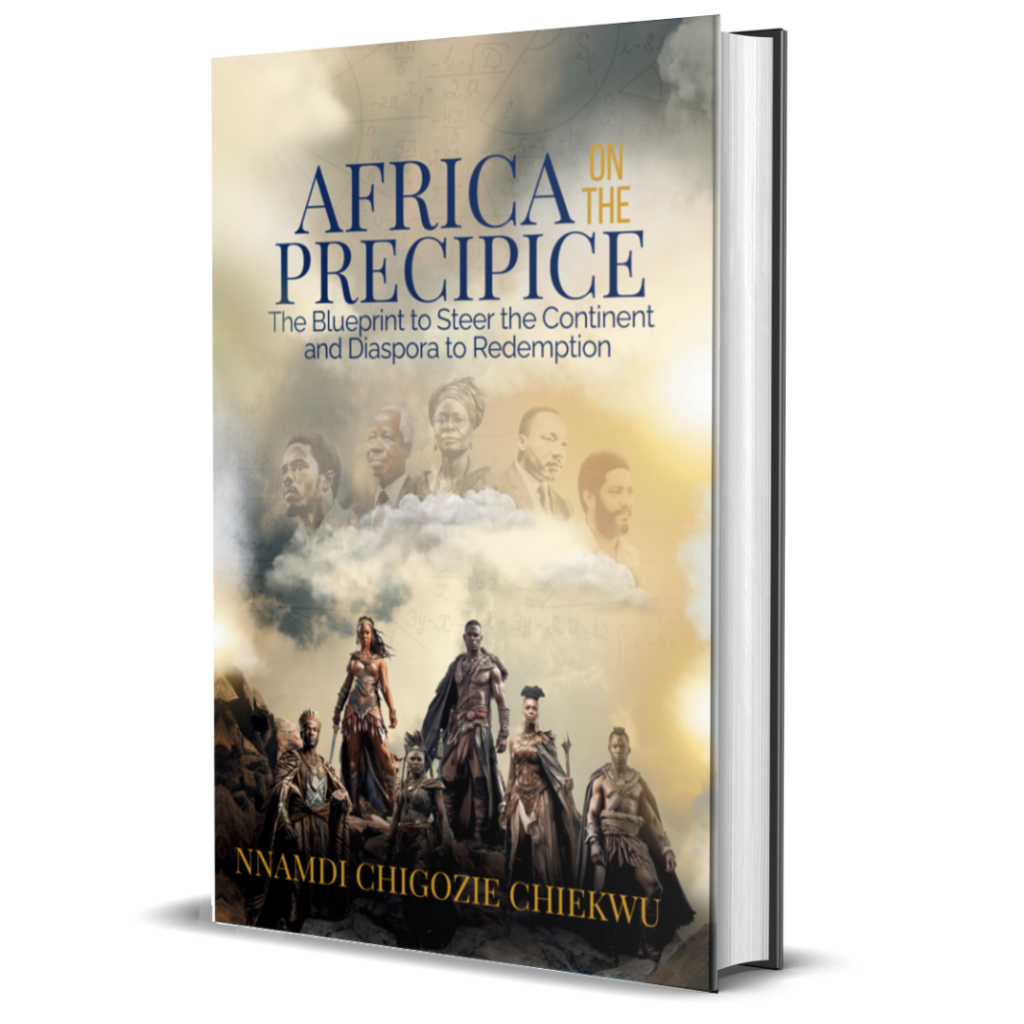THE ERA OF
AFRO-HEGEMONY
HAS BEGUN!
ABOUT BOOK
Africa on the Precipice (ATP) provides commentary on global geopolitics, economics, and world history, using African interests as a lens to give a different perspective on world events. The book specifically explores how and why Africa has not fared well in the ‘battle of civilizations’ (or global geopolitics) from the 15th century until present times. ATP also presents a bold blueprint to make African countries dominant on the international stage through an ideology originated by the author called ‘Afro-Hegemonism’.
ATP sounds the alarm for African countries that they must undergo transformational socioeconomic restructuring by 2030. The consequence of not doing so, will see Africans continue to be a global underclass in a geopolitical landscape that is quickly evolving. Moreover, the ultimate price for not embracing revolutionary change now, could see Africans permanently lose their sovereignty, treasure, and freedom in the 21st century.
AFRO-HEGEMONISM EXPLAINED
Afro-Hegemonism
Afro-Hegemony is an ideology that advocates for the rediscovery and adoption of authentic African socioeconomic and political models to ensure the wellbeing of all peoples of African descent and the world at-large.
Fundamentally, Afro-hegemonism is an evolution of the ideology of Pan-Africanism (unity among all peoples of African descent) but is more purposeful and prescriptive in the steps to its implementation which are outlined as follows:
1.
Objective
African custodianship of the planet to protect African lives, and to ensure peace, equity, and wellbeing for all peoples.
2.
Strategy
Increase global territories and institutions under African influence by strengthening African political and economic power.
3.
Tactics
Leveraging of technology to reinforce coordination, information sharing, and knowledge production between African institutions and peoples worldwide (Pan-Africanism).
4.
Implementation & System Mechanism
Creation of a supernational governing entity (the Africa Defense & Advancement Federation [ADAF]) to implement and manage the Afro-hegemonist agenda.
5.
Incentive Structure
Holistic wealth creation and enhancement of wellbeing among African states, and between the African continent and the diaspora.
Africa Defense & Advancement Federation (ADAF)
ADAF is the juggernaut that Africa has been waiting for to protect and advance its interests, hence its name (Africa Defense and Advancement Federation).
ADAF has been created in recognition of the fact that the world is at war with Africa, and so, Africans must mobilize and unify to protect their interests. ADAF is not merely an organization; it is a sacred entity that represents the memories of African ancestors from yesteryear, the will of African people today, and the hopes of African children tomorrow.
ADAF will become the new governing body that supports all people of African descent globally. The five tenets of ADAF are as follows:
1.
Federation of African Countries
African countries will not be able to implement meaningful strategies that will transform the continent unless they unite under a federalist system. Uniting under a federation allows for shared resources, maximization of economic value, cost reduction, leverage in negotiations with foreign countries, greater military security from foreign threats, and societal cohesion. ADAF is the federating entity under which all African countries will coalesce.
3.
Economic Protectionism
Africa must protect and prioritize its domestic markets and industries, as well as reframe its definition of economic development to center on; “living within our means and rejecting a consumption-based economic model.”
5.
Black Empowerment
Black empowerment is the process of supporting people of African descent in the diaspora to gain economic and political powers in foreign lands. By gaining more power abroad, more lands and wealth will be aggregated under the Black African empire, of which ADAF is the head. Black empowerment is a strategic shift from Africa continually playing defense to playing offense on the global stage.
2.
Diplomatic Isolationism
An open-door policy coupled with inequitable participation in multilateral institutions has weakened Africa and rendered the continent toothless on the global stage. Moving forward, Africa under ADAF will follow its own laws domestically and internationally. ADAF will engage in a process of “de-foreignization” of the continent’s political and social institutions to allow for a proper reset of Africa’s operating environment. Africa must stand on its human capital talent and resources, or it shall not stand at all.
4.
Continental Demilitarization
The military occupation of Africa, which has continued in one form or the other for over five hundred years, will end under the governance of ADAF. Foreign military presence in Africa impinges on the sovereignty of the continent and poses an existential security risk.
1.
Federation of African Countries
African countries will not be able to implement meaningful strategies that will transform the continent unless they unite under a federalist system. Uniting under a federation allows for shared resources, maximization of economic value, cost reduction, leverage in negotiations with foreign countries, greater military security from foreign threats, and societal cohesion. ADAF is the federating entity under which all African countries will coalesce.
2.
Diplomatic Isolationism
An open-door policy coupled with inequitable participation in multilateral institutions has weakened Africa and rendered the continent toothless on the global stage. Moving forward, Africa under ADAF will follow its own laws domestically and internationally. ADAF will engage in a process of “de-foreignization” of the continent’s political and social institutions to allow for a proper reset of Africa’s operating environment. Africa must stand on its human capital talent and resources, or it shall not stand at all.
3.
Economic Protectionism
Africa must protect and prioritize its domestic markets and industries, as well as reframe its definition of economic development to center on; “living within our means and rejecting a consumption-based economic model.”
4.
Continental Demilitarization
The military occupation of Africa, which has continued in one form or the other for over five hundred years, will end under the governance of ADAF. Foreign military presence in Africa impinges on the sovereignty of the continent and poses an existential security risk.
5.
Black Empowerment
Black empowerment is the process of supporting people of African descent in the diaspora to gain economic and political powers in foreign lands. By gaining more power abroad, more lands and wealth will be aggregated under the Black African empire, of which ADAF is the head. Black empowerment is a strategic shift from Africa continually playing defense to playing offense on the global stage.

about author
NNAMDI CHIGOZIE CHIEKWU
Nnamdi Chiekwu is an entrepreneur and founder of The Namdex Group Africa (NGA), a private holding company with business interests in the energy, logistics, mining services, and agricultural sectors in West Africa. Mr. Chiekwu was a co-founder and partner at Namdex at Benjamin Jerold I, LLC (Member FINRA, NYSE, NYSE Arca, BATS & SIPC), a multi-service broker dealer, and one of the first firms on Wall Street to provide private placement fund raising services, exclusively to emerging African Private Equity fund managers. Prior to founding the Namdex Group, Mr. Chiekwu worked in corporate strategy and consulting for Fortune 100 companies and financial restructuring firms in the US. He attended Reinhardt University, where he received his bachelor’s degree in general commerce and graduated with honors. He earned his MBA at Emory University’s Goizueta Business School.




